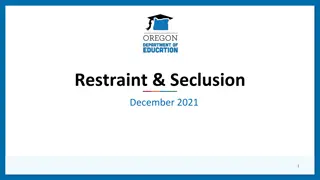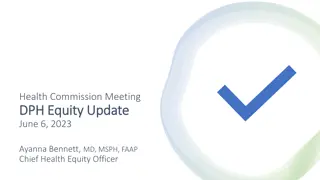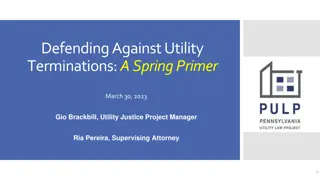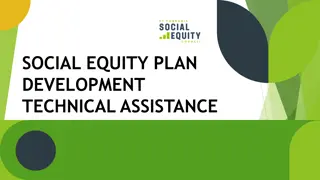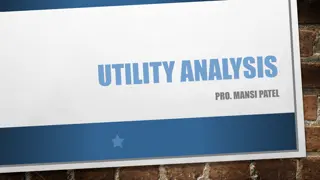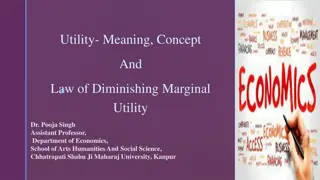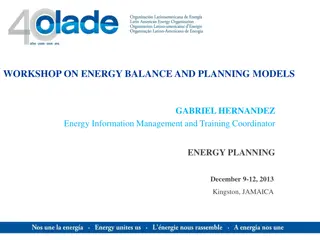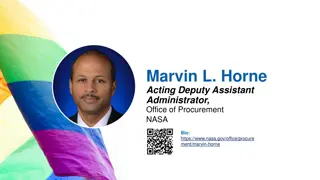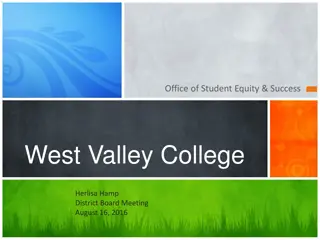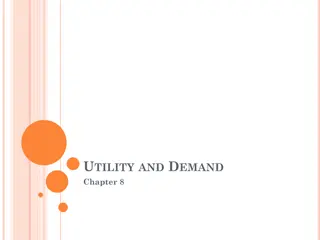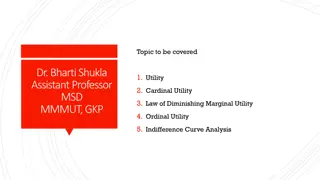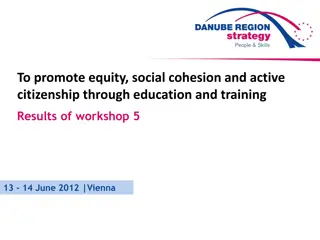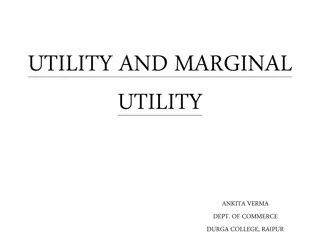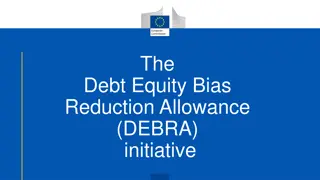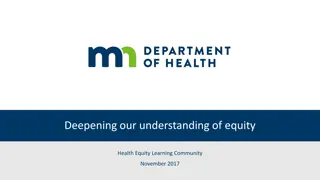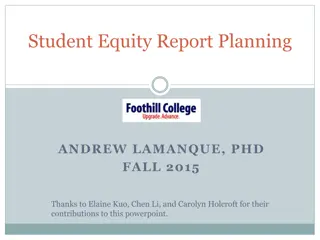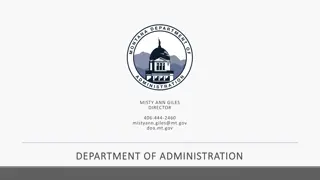Equity in Utility Planning Workshop and Discussion Overview
This content provides details about an upcoming joint workshop and discussion held by the Washington Utilities and Transportation Commission and Washington Department of Commerce on equity in utility planning. It covers topics such as greenhouse gas neutrality standards, clean energy implementation plans, and responsibilities for electric utilities. The focus is on ensuring all customers benefit from the transition to clean energy through equitable distribution of benefits and reducing burdens on vulnerable populations and impacted communities.
Download Presentation

Please find below an Image/Link to download the presentation.
The content on the website is provided AS IS for your information and personal use only. It may not be sold, licensed, or shared on other websites without obtaining consent from the author. Download presentation by click this link. If you encounter any issues during the download, it is possible that the publisher has removed the file from their server.
E N D
Presentation Transcript
JOINT WORKSHOP AND DISCUSSION Washington Utilities and Transportation Commission and Washington Department of Commerce Equity in Utility Planning February 5, 2020 starting at 8:30 am
RCW Description 19.405.010 Intent 19.405.040(8) 2030 Greenhouse gas neutral standard 19.405.060(1)(c)(iii) [IOU] 19.405.060(2)(b)(iii) [COU] Clean Energy Implementation Plans 19.280.030(1)(k) and (l) [Rules: 19.280.030(11)] Integrated Resources Plans 19.405.120 Low Income Energy Assistance Programs 19.405.140 DOH Cumulative Impact Analysis
RCW Description 19.405.010 Intent 19.405.040(8) 2030 Greenhouse gas neutral standard 19.405.060(1)(c)(iii) [IOU] 19.405.060(2)(b)(iii) [COU] Clean Energy Implementation Plans 19.280.030(1)(k) and (l) [Rules: 19.280.030(11)] Integrated Resources Plans 19.405.120 Low Income Energy Assistance Programs 19.405.140 DOH Cumulative Impact Analysis
RCW 19.405.040 Greenhouse gas neutrality Responsibilities for electric utilities (1) It is the policy of the state that all retail sales of electricity to Washington retail electric customers be greenhouse gas neutral by January 1, 2030. [ ] (8) In complying with this section, an electric utility must, consistent with the requirements of RCW 19.280.030 and 19.405.140, ensure that all customers are benefiting from the transition to clean energy: Through the equitable distribution of energy and nonenergy benefits and reduction of burdens to vulnerable populations and highly impacted communities; long-term and short-term public health and environmental benefits and reduction of costs and risks; and energy security and resiliency.
RCW 19.405.060 Clean energy implementation plan Compliance criteria (1)(a) By January 1, 2022, and every four years thereafter, each investor-owned utility must develop and submit to the commission: (i) A four-year clean energy implementation plan for the standards established under RCW 19.405.040(1) and 19.405.050(1) that proposes specific targets for energy efficiency, demand response, and renewable energy; and (ii) Proposed interim targets for meeting the standard under RCW 19.405.040(1) during the years prior to 2030 and between 2030 and 2045. [ ] (c) The commission, after a hearing, must by order approve, reject, or approve with conditions an investor- owned utility's clean energy implementation plan and interim targets. The commission may, in its order, recommend or require more stringent targets than those proposed by the investor-owned utility. The commission may periodically adjust or expedite timelines if it can be demonstrated that the targets or timelines can be achieved in a manner consistent with the following: [ ] (iii) Ensuring that all customers are benefiting from the transition to clean energy: Through the equitable distribution of energy and nonenergy benefits and the reduction of burdens to vulnerable populations and highly impacted communities; long-term and short-term public health and environmental benefits and reduction of costs and risks; and energy security and resiliency
RCW 19.280.030 Development of a resource plan Requirements of a resource plan Each electric utility must develop a plan consistent with this section. (1) [ ] The integrated resource plan, at a minimum, must include:[ ] (k) An assessment, informed by the cumulative impact analysis conducted under RCW 19.405.140, of: Energy and nonenergy benefits and reductions of burdens to vulnerable populations and highly impacted communities; long-term and short-term public health and environmental benefits, costs, and risks; and energy security and risk; and (l) A ten-year clean energy action plan for implementing RCW 19.405.030 through 19.405.050 at the lowest reasonable cost, and at an acceptable resource adequacy standard, that identifies the specific actions to be taken by the utility consistent with the long-range integrated resource plan.
Principles from RCW 19.405.010
Principles from RCW 19.405.010: Findings Intent (1) Washington must address the impacts of climate change by leading the transition to a clean energy economy [ ] by transforming its energy supply, modernizing its electricity system, and ensuring that the benefits of this transition are broadly shared throughout the state. (4) Washington can accomplish the goals of [CETA] while: Promoting energy independence; creating high-quality jobs in the clean energy sector; continuing to encourage and provide incentives for clean alternative energy sources, including providing electricity for the transportation sector; maintaining safe and reliable electricity to all customers at stable and affordable rates; and protecting clean air and water in the Pacific Northwest.
Principles from RCW 19.405.010: Findings Intent (5) Utilities in the state have an important role to play in this transition, and must be fully empowered, through regulatory tools and incentives, to achieve the goals of this policy. In combination with new technology and emerging opportunities for customers, this policy will spur transformational change in the utility industry. (5) The utilities and transportation commission's statutory grant of authority for rate making includes consideration and implementation of performance and incentive-based regulation, multiyear rate plans, and other flexible regulatory mechanisms where appropriate to achieve fair, just, reasonable, and sufficient rates and its public interest objectives.
Principles from RCW 19.405.010: Findings Intent (6) The public interest includes, but is not limited to: The equitable distribution of energy benefits and reduction of burdens to vulnerable populations and highly impacted communities; long-term and short-term public health, economic, and environmental benefits and the reduction of costs and risks; and energy security and resiliency. It is the intent of the legislature that in achieving this policy for Washington, there should not be an increase in environmental health impacts to highly impacted communities.
Question: Based on the legislative intent, what existing utility processes or future programs do you see as opportunities for operationalizing equity? Think on your own (4 min) Pair up and discuss (4 min) 2 pairs connect and discuss (4 min) Brief report out with the group (2 min per group)
Equity Area Access to Clean Energy Indicator Energy and cost savings for customers in aggregate Example/Program Energy efficiency and renewable energy programs Locations and expenditures of existing and planned community energy projects Net metering participation EV charger rebate programs Participation and attrition rate of programs, locations and monetary benefits received Low income community solar
Look through the list and please answer the following: please include some indicators and examples. What is missing from the list of equity areas? If you add an equity area, Brainstorm with your group and designate one person that will report out to the whole room. 10 minutes
Report out (2 min each) and Full Room Discussion 25 minutes total
Look through the list and please answer the following: What are additional indicators that could be included on this list? Brainstorm with your group and designate one person that will report out to the whole room. 10 minutes
Report out (2 min each) and Full Room Discussion 25 minutes total
RCW 19.405.040(8) Description 2030 Greenhouse gas neutral standard Commerce Workshop in spring UTC Draft rules and questions in IRP, PoE, and CEIP dockets 19.405.060(1)(c)(iii) [IOU] Clean Energy Implementation Plans -- -- 19.405.060(2)(b)(iii) [COU] Draft rules and questions in IRP docket 19.280.030(1)(k) and (l) Integrated Resources Plans Small utilities workshop (~April) [Rules: 19.280.030(11)] Workshop in spring IRP Docket: UE 190698 PoE Docket: UE 190837 CEIP Docket: UE 191023 Comments were due: 12/20/2019 Comment period is expected: ~Early March Comments due: 2/28/2020 by 5:00 p.m.
Thank you for your participation! Kendra White Energy Policy Advisor Utilities and Transportation Commission kendra.white@utc.wa.gov Sarah Vorpahl Senior Energy Policy Specialist Department of Commerce sarah.vorpahl@commerce.wa.gov




